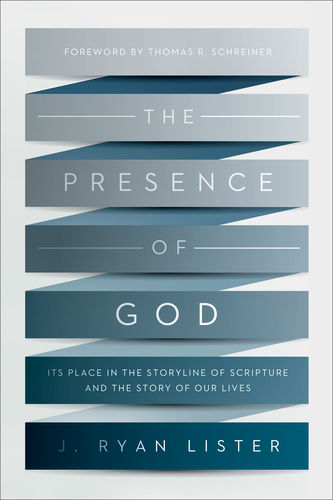J. Ryan Lister: The Presence of God
 J. Ryan Lister, The Presence of God: Its Place in the Storyline of Scripture and the Story of our Lives (Wheaton, IL: Crossway, 2015) 368 pages, ISBN 9781433539152.
J. Ryan Lister, The Presence of God: Its Place in the Storyline of Scripture and the Story of our Lives (Wheaton, IL: Crossway, 2015) 368 pages, ISBN 9781433539152.
In The Presence of God: Its Place in the Storyline of Scripture and the Story of our Lives J. Ryan Lister, seeks to trace the theme of God’s presence throughout redemptive history. The bulk of the volume is devoted to tracing the “vistas and valleys of God’s mighty acts in redemptive history to show where God revels his presence … and help us understand why he does so” (23). Lister’s major argument is twofold. First, that the “presence of God is a central goal in God’s redemptive mission” (23). Second, that the “presence of God is the agent by which the Lord accomplishes his redemptive mission” (24).
The argument is presented in three parts. The chapters in part one attempt to show “how the presence of the Lord is a central eschatological purpose in the Lord’s redemptive mission” (33). Lister helpfully begins his study by providing a definition of the presence of God as the “manifestation of God in time and space—mediated in some sense—working to bring forth redemption and redemption’s objectives and simultaneously, the unmediated, fully relational, and eschatological manifestation of God first experienced in Eden and awaiting the elect in the new creation” (51). Lister’s thesis is then accomplished by looking at Genesis 1-3 and Revelation 21-22 in order to establish that “what Eden was in potential, the New Jerusalem is in full” (86). God’s presence in the Garden and the promised dynasty begun with Adam, though unfulfilled, find their completion in the new heaven and new earth (86).

J. Ryan Lister
Parts two and three set out to demonstrate that in both the Old and New Testaments God accomplishes his purposes “by becoming present” (33). Part three deals with God’s presence in light of the person and work of Christ. Here Lister also presents the theme of Church as temple and the implication of this for evangelism and missions.
Lister is to be applauded for doing good biblical theology. This in itself makes it a valuable study. However, while he acknowledges that space limitations precluded him from addressing some books, such as the Wisdom literature, Ruth, Song of Songs and Esther (146, n.1), this omission is unfortunate. If excluded books were included, it would have made this a more comprehensive work. Perhaps limiting certain sections (over fifty percent of part two is spent on the Pentateuch) and scaling back on certain elaborate footnotes would have made room for the inclusion of omitted and sparsely addressed portions (the Minor Prophets) of the Old Testament.
Reviewed by David Seal
Publisher’s page: https://www.crossway.org/books/the-presence-of-god-tpb/
Category: Biblical Studies, Spring 2016


